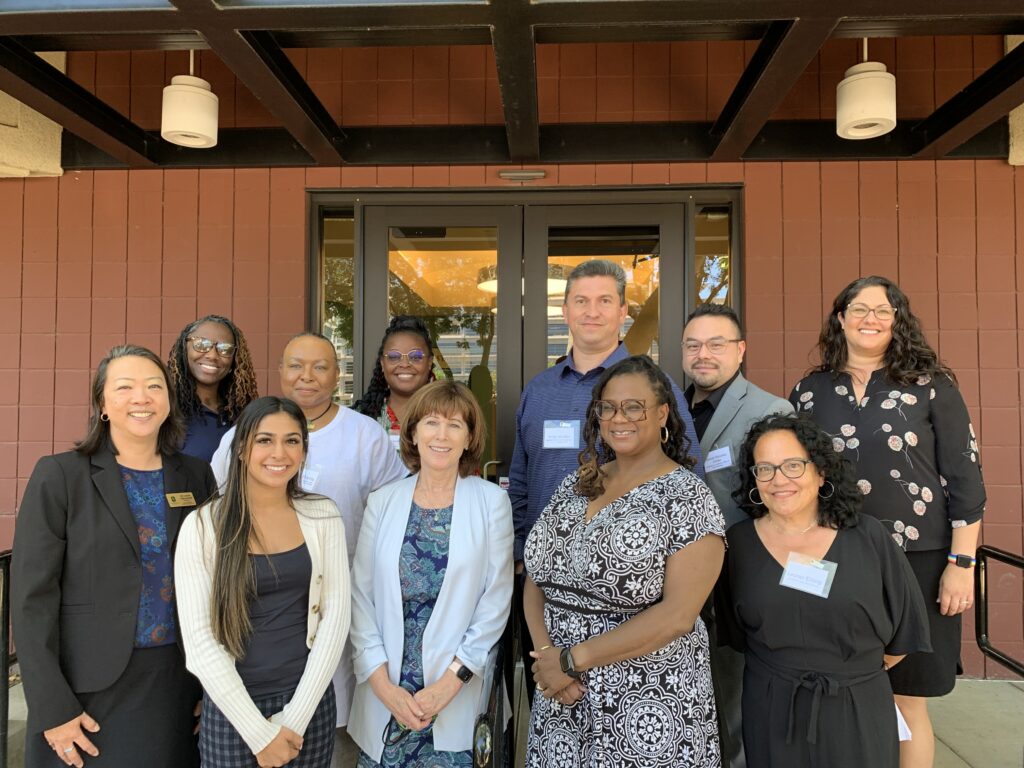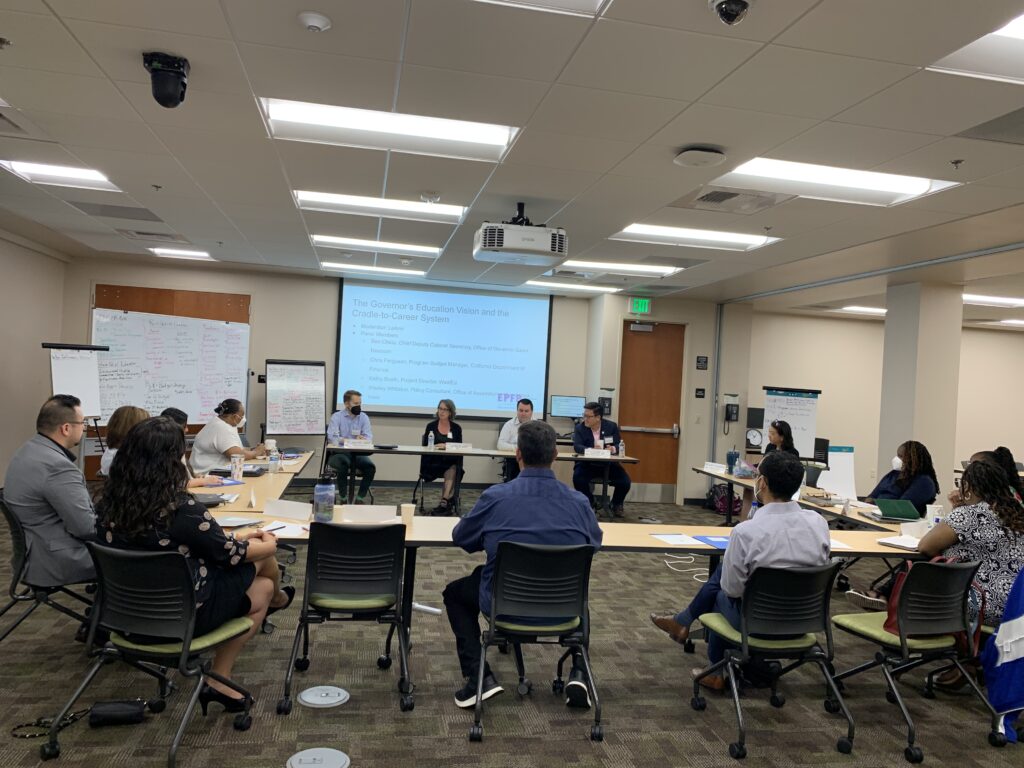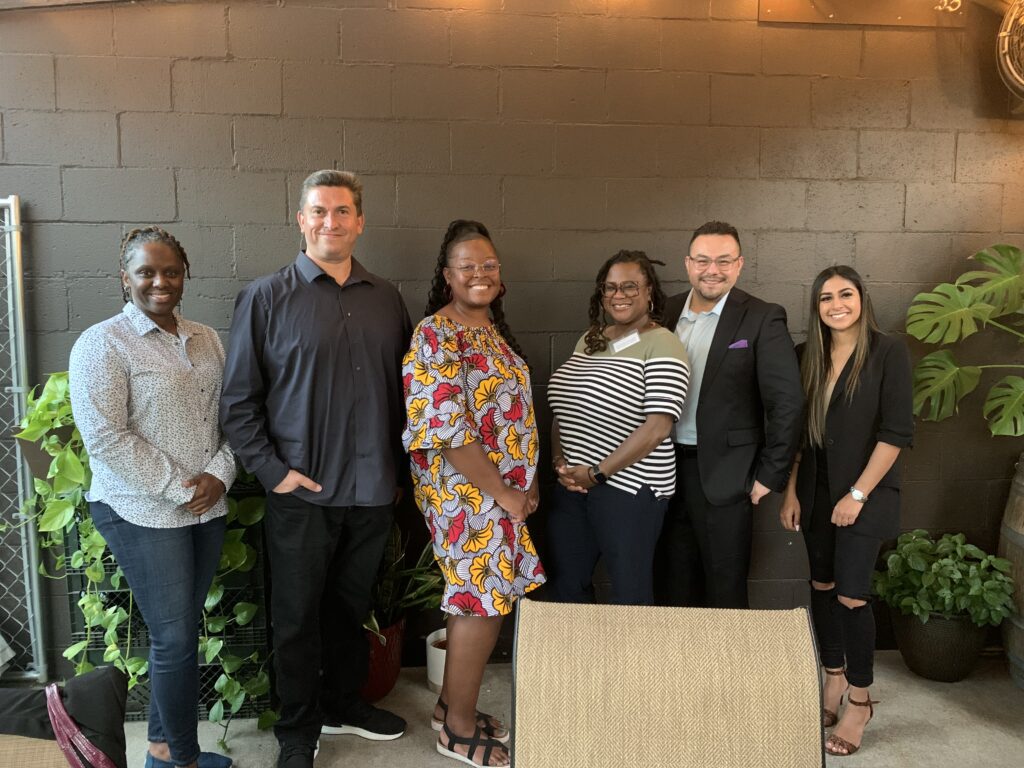For the 2022-23 year, the California Education Policy Fellowship Program (EPFP) will work on projects focused on addressing racial justice issues that have been exacerbated by the racial equity and COVID pandemics. Why should racial equity be important for education leaders in K-12 and postsecondary education? How can our education leaders make a change from where they sit?
EPFP is a professional development program focused on education policy (both K-12 and postsecondary) that brings together fellows from across the state to provide professional development in policy, leadership, and networking. It is sponsored by the Institute for Educational Leadership, the state budget, and philanthropic funding from the Hewlett Foundation and College Futures Foundation. The program is entering its seventh year in 2022-23. As a statewide initiative, EPFP provides an opportunity for those from the K-12 and postsecondary practice and policy spheres to come together to break down silos that may exist in order to effectively create change.
For the 2022-23 year, CA EPFP consultant, Dr. Thad Nodine, authored Towards Racial Justice in Education in California’s Education Systems: An Introduction to Policy Spanning K-12 and Higher Education that will focus and guide our conversations for the 2022-23 cohort. The report emphasizes how education leaders can create change that addresses racial justice and equity issues from where they sit.
In August 2022, the members of the 2020-21 CA EPFP cohort met in Sacramento to experience an in-person program. This cohort, originally held online during COVID, was previously unable to experience the in-person networking that is an important part of the program.

Our August 2022 event featured content and presentations on:
- Who influences policy and how
- Processing the pandemic
- Sacramento State’s Antiracism and Inclusive Campus Plan
- Using your strengths during challenging times
- An insider’s view of the state and legislative budget process
- The Governor’s education vision and the cradle-to-career data system
Dr. LeAnn Fong-Batkin, Executive Director of the Education Insights Center (EdInsights) and Leonor Ehling, Executive Director of the Center for California Studies, co-direct EPFP and co-facilitated the weekend.
“The EPFP program provides a unique opportunity for our education leaders to make connections across the K-12 and postsecondary segments that they can use to create change,” said Leonor Ehling.
Dr. LeAnn Fong-Batkin stated, “My own EPFP experience was instrumental and influenced how I think about policy today and I know that I can connect with my own and other EPFP cohorts to make change from where we sit. By using the three core elements–policy, leadership, and networking–our fellows become changemakers.”
Dr. Mia Settles-Tidwell and Dr. Michael Nguyen, from Sacramento State’s Inclusive Excellence Division presented Sacramento State’s Antiracism and Inclusive Campus Plan (AICP) that details how the campus will work towards becoming an antiracist and inclusive campus in the next five years and beyond. Their presentation highlighted the importance of context and how human-centered, culturally grounded and data informed approaches are key pillars to education transformation and racial justice. The fellows had an opportunity to review a sample policy and work to change the policy using the concepts of the AICP.
Polly Chandler, founder of Polly Chandler Consulting, had the fellows take a step back to process the pandemic and its effects on each person as well as in the educational policy environments in which they sit. Fellows gathered in small groups to discuss how each person used their CliftonStrengths to overcome the challenges of the pandemic. One fellow stated: “I think one concrete thing the program helped me learn was the exploration of our strengths and how to leverage skills of a team. It’s helped to better understand “ceilings and balconies” in our own selves and that of teammates and colleagues.”
An Insider’s View of the State and Legislative Budget Process session provided an opportunity for the fellows to learn in great detail about the state’s budget, and legislative process and timelines to answer the question–where can I make change within this process? Misty Padilla Feusahrens, special assistant to Assembly Speaker Anthony Rendon, Mark Martin, principal consultant of the Assembly’s higher education budget subcommittee, and Amy Superinger, owner and consultant, Amy Supinger Strategies gave the fellows an insider’s view of where change can be created in this process (hint: change starts at your local level). Legislative and budget deadlines must also be kept in mind, along with other things, such as the healthiness of the state’s budget.

Ben Chida, Chief Deputy Cabinet Secretary, from the Office of Governor Gavin Newsom offered thoughts about the Governor’s education vision. Then, he and panelists Chris Ferguson, Program Budget Manager of the California Department of Finance, Wesley Whitaker, Policy Consultant, for Assemblymember of Jacqui Irwin’s office, and Kathy Booth, Project Director from WestEd discussed their roles in creating the plan for the Cradle-to-Career Data System (C2C). The C2C system aligns Governor Newsom’s thinking about education–as a continuum–that begins from birth and continues through careers. The C2C will be California’s statewide longitudinal data system and is currently being implemented by the state of California’s Office of Cradle-to-Career data.

At the end of each day, the fellows spent time networking through group dinners.
One fellow offered a final thought about the program: “EPFP has helped me understand that what I really want to do is try and influence education at a higher level than just my individual campus. Talking with peers across different sectors has helped me grow confident in being able to clearly articulate my goals and the actions needed to get there.”
EPFP applications for the 2023-24 year will open in February 2023. Please join our email listserv to stay informed.

